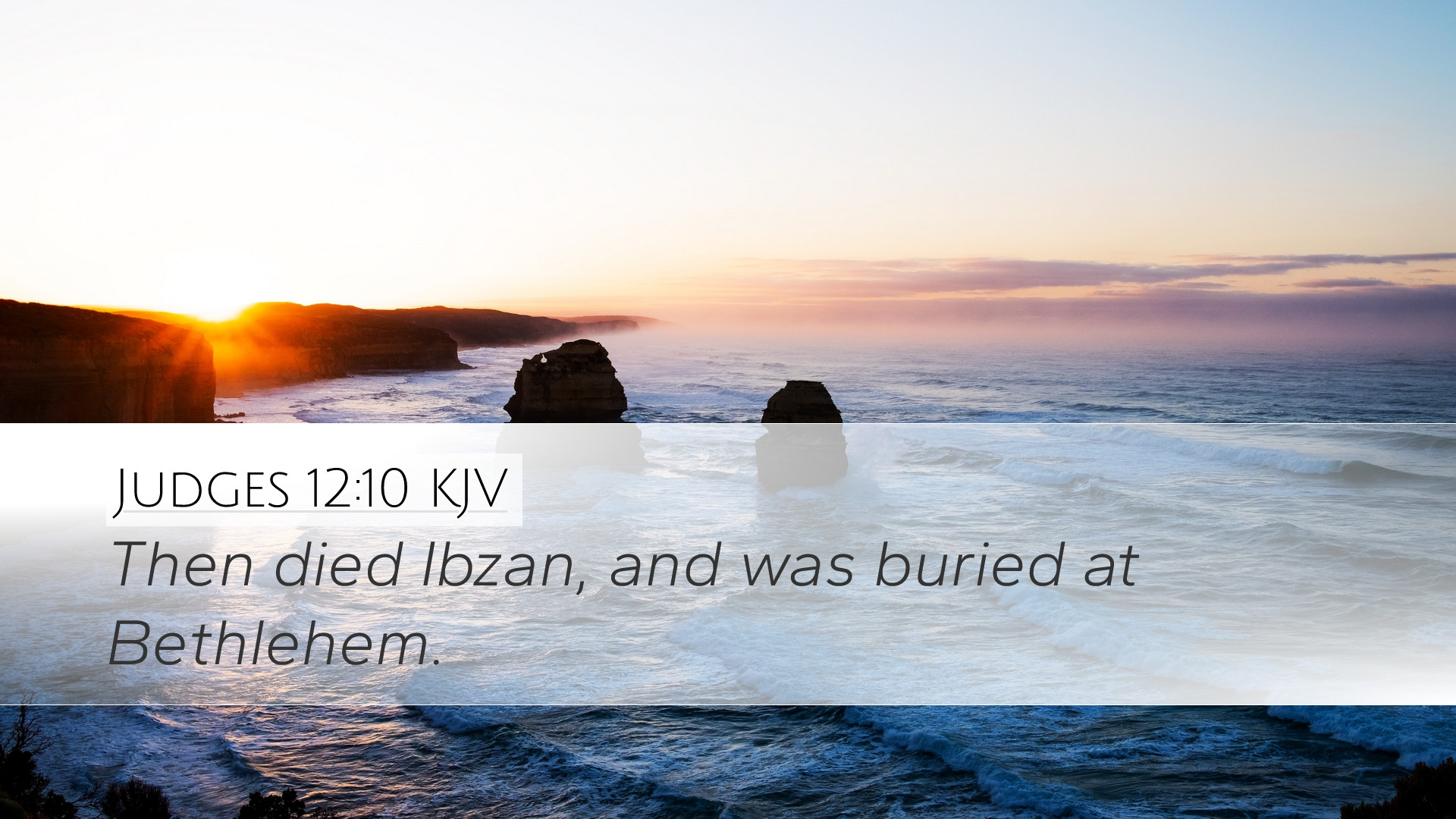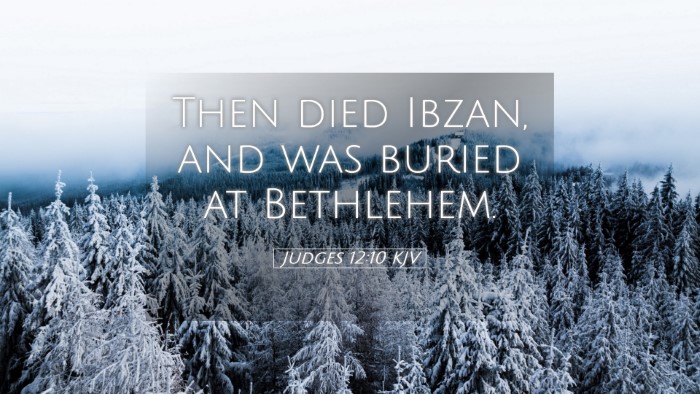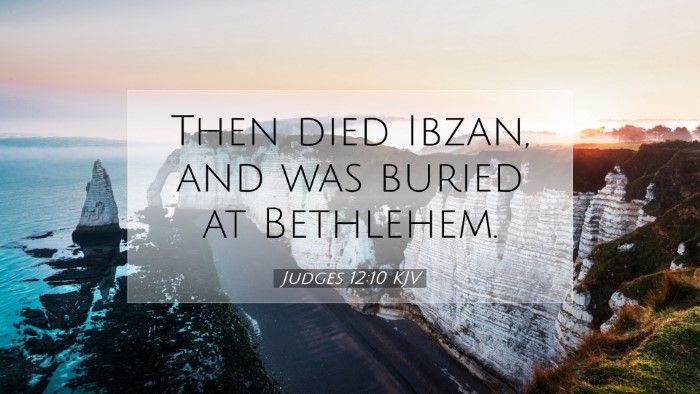Old Testament
Genesis Exodus Leviticus Numbers Deuteronomy Joshua Judges Ruth 1 Samuel 2 Samuel 1 Kings 2 Kings 1 Chronicles 2 Chronicles Ezra Nehemiah Esther Job Psalms Proverbs Ecclesiastes Song of Solomon Isaiah Jeremiah Lamentations Ezekiel Daniel Hosea Joel Amos Obadiah Jonah Micah Nahum Habakkuk Zephaniah Haggai Zechariah MalachiJudges 12:10
Judges 12:10 KJV
Then died Ibzan, and was buried at Bethlehem.
Judges 12:10 Bible Commentary
Bible Commentary on Judges 12:10
Judges 12:10: "Then died Jephthah the Gileadite, and was buried in one of the cities of Gilead."
Introduction
The passage of Judges 12:10 offers a brief but profound conclusion to the life of Jephthah, a significant judge of Israel. His tenure was marked by tumultuous events, character traits, and a multifaceted legacy. This commentary synthesizes insights from notable public domain theologians—Matthew Henry, Albert Barnes, and Adam Clarke—to provide a deep understanding of this verse's theological and historical significance.
Contextual Background
Jephthah's story is situated in a cycle of apostasy, oppression, repentance, and deliverance characteristic of the Book of Judges. He led Israel during a period of conflict against the Ammonites, illustrating the precarious nature of Israel's national identity and leadership at the time.
Historical Significance
This verse serves as a marker of the end of Jephthah's leadership, emphasizing both the human element of leadership—its temporality—and the divine orchestration of events in Israel's history.
Analysis of Jephthah's Life and Leadership
Jephthah is presented as a complex character. His origins as the son of a harlot and his subsequent rejection by his half-brothers contribute to a narrative of struggle and eventual rise. The theological implications of his leadership style and his vow to God, which resulted in a controversial act towards his daughter, necessitate careful scrutiny.
Matthew Henry’s Insights
Matthew Henry emphasizes the gravity of leadership and the enduring consequences of one's actions. He notes that Jephthah's death did not end the impact of his choices. His commentary reflects on the effects of Jephthah's vow, demonstrating how deeply personal decisions can reverberate through communal history.
Albert Barnes’ Perspectives
Albert Barnes highlights the reflection of mortality in this verse. He points out that Jephthah’s burial indicates the finality of death, a stark reminder to leaders of their temporal nature. Barnes suggests that the account subtly invites readers to consider the legacy one leaves behind—the culmination of a life lived in faithfulness to God or otherwise.
Adam Clarke’s Observations
Adam Clarke, with his critical approach, provides insights into geographical and cultural implications regarding Jephthah's burial. He remarks on the customary practices of burial among the Israelites, connecting it to the concept of honor and remembrance. Clarke points out that being buried in a city of Gilead signifies Jephthah’s enduring connection to his homeland and community, despite the mixed legacy he left behind.
Theological Implications
The brief mention of Jephthah's death serves as a significant pivot in Judges, symbolizing the duality of God’s grace and human frailty. Theologically, this invites a conversation about the nature of divine calling versus human actions—how God's purposes can be fulfilled even through flawed individuals.
The Nature of Vows
Jephthah’s vow is paramount in understanding his character. The narrative surrounding it teaches about the weight of promises made before God, underscoring the gravity that such commitments entail. It speaks to pastors and leaders about the need for discerning the Spirit’s guidance before making vows.
Burial Practices as a Reflection of Honor
Jephthah's burial in Gilead can also be seen as indicative of Israel's respect for their leaders, despite the complexities of their lives. This aspect reaffirms the importance of honoring those who have led, regardless of their failures, showcasing the need for grace within leadership circles.
Contemporary Application
For today’s pastors, students, and theologians, Judges 12:10 prompts a deeper examination of leadership, legacy, and the complexities of human decisions. It invites reflection on how contemporary Christian leaders navigate their commitments, the expectations of their congregations, and the footprints they leave in spiritual history.
Lessons on Leadership
- Understanding Human Frailty: Acknowledging that all leaders have weaknesses which can lead to significant consequences.
- Considering the Impact of Vows: Recognizing that solemn promises should be made with great caution and prayerful consideration.
- Leaving a Godly Legacy: Striving to live in a manner that honors God and serves as a positive example for future generations.
The Role of Community in Leadership
Just as Jephthah was remembered and buried among his people, so too should current leaders foster a sense of community and accountability, ensuring that their leadership is rooted in the collective faith of their congregation.
Conclusion
Judges 12:10 serves as a poignant reminder of the inherent realities of life and death, leadership, and legacy. Through the juxtaposition of Jephthah's life and the brevity of this verse, we gain profound insights into the human condition, the righteousness of God's plans, and an invitation to reflect on our paths as we lead others. In the end, the story of Jephthah challenges all to consider how we can align our lives more closely to our divine calling, fostering a legacy that reflects the heart of God.


